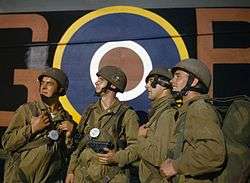Combat helmet
A combat helmet or battle helmet is a type of helmet, a piece of personal armor designed specifically to protect the head during combat.
History
Helmets are among the oldest forms of personal protective equipment and are known to have been worn by the Akkadians/Sumerians in the 23rd century BC, Mycenaean Greeks since the 17th century BC,[1][2] the Assyrians around 900 BC, ancient Greeks and Romans, throughout the Middle Ages, and up to the end of the 17th century by many combatants.[3] Their materials and construction became more advanced as weapons became more and more powerful. Initially constructed from leather and brass, and then bronze and iron during the Bronze and Iron Ages, they soon came to be made entirely from forged steel in many societies after about 950 AD. At that time, they were purely military equipment, protecting the head from cutting blows with swords, flying arrows, and low-velocity musketry.
Military use of helmets declined after 1670, and rifled firearms ended their use by foot soldiers after 1700[3] but the Napoleonic era saw ornate cavalry helmets reintroduced for cuirassiers and dragoons in some armies which continued to be used by French forces during World War I as late as 1915.[4]
World War I and its increased use of artillery renewed the need for steel helmets, with the French Adrian helmet and the British Brodie helmet being the first modern steel helmets used on the battlefield,[5][6] soon followed by the adoption of similar steel helmets, such as the Stahlhelm[7][8][9] by the other warring nations. Such helmets offered protection for the head from shrapnel and fragments.
Today's militaries often use high quality helmets made of ballistic materials such as Kevlar and Aramid, which offer improved protection. Some helmets also have good non-ballistic protective qualities, against threats such as concussive shock waves from explosions.[10][11]
Many of today’s combat helmets have been adapted for modern warfare requirements and upgraded with STANAG rails to act as a platform for mounting cameras, video cameras and VAS Shrouds for the mounting of Night Vision Goggles (NVG) and monocular Night Vision Devices (NVD).
Beginning in the early 20th century, combat helmets have often been equipped with helmet covers to offer greater camouflage. There have been two main types of covers, mesh nets were earlier widely used, but most modern combat helmets use camouflage cloth covers instead.
By the late 20th century, starting in the 1970s and 1980s, new materials such as kevlar and aramid began replacing steel as the primary material for combat helmets, in an effort to improve weight, ballistics protection, and protection against head injuries caused by blasts. This practice still continues into the 21st century, with further advancement and refinements in the fibers used, design and shape of the helmet, and increased modularity. Early helmet systems of this new design are the American PASGT, the Spanish MARTE, the Italian SEPT-2 PLUS, and British Mk6.
List of military helmets
Current
- A Mk. 6 Helmet, issued to British military personnel from 1985.
 A modern German Army Gefechtshelm
A modern German Army Gefechtshelm United States soldier wearing the standard issue Advanced Combat Helmet.
United States soldier wearing the standard issue Advanced Combat Helmet._checkpoint_in_Helmand_province%2C_Afghanistan%2C_March_30%2C_2013_130330-M-BO337-105.jpg) Ops-Core FAST helmet, showing modern battlefield accessories such as NVG mounts, communications gear and a helmet camera.
Ops-Core FAST helmet, showing modern battlefield accessories such as NVG mounts, communications gear and a helmet camera.
List
| Model | Origins | Users |
|---|---|---|
| Ops-Core FAST | | Used by the United States special operations, United States SWAT and Law Enforcement, German Bundeswehr, Norwegian Armed Forces and others. |
| Ops-Core FAST High Cut Helmet | | Used by Australian and New Zealand Military and Law Enforcement personnel[12] |
| SPECTRA helmet | | Used by the French Army, Austrian Army, Bangladesh Army, Danish Army, Malta Army, Royal Moroccan Army, Ukrainian Ground Forces, and United Nations peacekeeping forces[13] |
| Enhanced Combat Helmet (ECH) | | |
| Advanced Combat Helmet (ACH) | | Developed from the Modular Integrated Communications Helmet, the ACH is now the standard issue helmet of the US Army.[14][15][16] |
| Modular Integrated Communications Helmet (MICH) | | Developed for special operations use by the United States Army, it became the basis for the Advanced Combat Helmet |
| Lightweight Helmet (LWH) | | Used by United States Marine Corps[17] |
| Mk. 6 Helmet | | Used by British Armed Forces.[18] being replaced by the Mk. 7 Helmet |
| Mk. 7 Helmet | | Used by British Armed forces |
| M76 paratrooper helmet | | Used by British Armed forces Paratroopers and Airborne forces. |
| BK-6 Helmet | | Used by the Croatian Army, Swedish Army, German Army, Kuwaiti Army, French Army, Singapore Army, Israel Army, Saudi Arabian Army, Polish Armed Forces, Australian Army, Turkish Armed Forces, Czech Army, Bulgarian Army, United Arab Emirates Army, Lithuanian Armed Forces, Mexican Army, Spanish Army, Pakistan Army, Malaysian Army, Saudi Arabian Army, Finnish Army, National Army of Colombia, Armed Forces of the Republic of Kazakhstan, Indonesian Army, Italian Army, Military of Hungary, Armed Forces of the Argentine Republic, People's Liberation Army and by the police forces of the following countries: Croatia, Turkey, UK, Spain, Republic of Macedonia, Egypt, Russia, Saudi Arabia, Turkey, Colombia, Italy, Ukraine, by Argentina and by the UN demining committee.[19] - Similar to the Gefechshelm B826. |
| BK-9 Helmet | | Used by the Croatian Army. Updated version of the BK-6. - Similar to the Gefechshelm B826. |
| BK-3 Helmet | | Used by the Croatian Army. Further updated version of the BK-6. Also used by Bulgaria. - Similar to the Gefechshelm B826. |
| CCB | | Used by the Brazilian Armed Forces in two versions: Polymer and Kevlar.[20] |
| BK-3 Helmet | | Kevlar helmet worn by the Bulgarian Land Forces. Replacing the older steel M36 type C Helmet. - Similar to the Gefechshelm B826. |
| M91 Helmet | | PASGT kevlar helmet used by the Australian Defense Force. Was made by RBR Armour Systems Pty Ltd (Australia.) Also made by Gentex USA. The Australian PASGT helmet was identical to the USA PASGT helmet with the exception of a 3-point chin strap, much like the chin strap of the German B826 Gefechsthelm. Was replaced in 2004. |
| Enhanced Combat Helmet (RBH 303 AU) | | MICH 2000 style helmet made by Rabintex, Israel[21] adopted by the Australian Defence Force in 2004, replacing the M91 PASGT helmet. Also in service with the New Zealand Defence Force since 2009. |
| CG634 | | Used by the Canadian Forces since 1998 - SPECTRA type helmet.[22][23] |
| M92 Helmet | | First kevlar helmet used by the Danish Armed Forces. - Imported SPECTRA helmet. Design later incorporated into the M/96. |
| Gron Helmet | | Early kevlar helmet used by the Danish Armed Forces while peacekeeping. - Imported Gefechtshelm B826. |
| M/96 Helmet | | Kevlar helmet used by the Danish Armed Forces. - SPECTRA type helmet. Might be replaced by ACH type helmet. |
| CABAL II | | Ballistic Helmet M-6 for Argentine Infantry Approved by CITEFA NIJ Level II according to the standards currently in stage R3B certified to MIL-Std 662 E.[24] However it wasn´t issued in large scales. |
| PASGT helmet | | First issued in 1983 to replace the M1 helmet. Former kevlar helmet used by the United States Army, Marine Corps, Navy. Used by the USAF, but is being phased out by the ACH[25] US Air Force.[26] Adopted by the Mexican Armed Forces in the 1990s to replace the M1 helmet. Replaced the M1 helmet of the Argentine army and modified with padded interiors. US-made PASGT helmets (by UNICOR and Gentex) replaced the New Zealand M1 helmet and were in use until the adoption of the Australian ECH.[27] |
| M1994 | | First Kevlar helmet adopted by the Norwegian Armed Forces. - Imported Gefechtshelm B826. |
| Hjelm Cato | | Proprietary kevlar helmet adopted by the Norwegian Armed Forces in the early 2000s (decade). - Similar to the Swedish Hjalm 90. |
| GOLFO | | Military of Chile, Similar to the PASGT. |
| GK80 | | People's Liberation Army |
| QGF03 | | People's Liberation Army |
| QGF02 | | People's Liberation Army |
| SSh-68 | | Steel helmet Russian Army Russia |
| STSh-81 | | Titanium helmet Russian Special Forces Russia |
| 6B7 | | Kevlar helmet Russian army |
| 6B7-1L | | Kevlar helmet Russian army and Naval Infantry Russia |
| Kolpak 2 | | Kevlar helmet Russian army |
| 6B27 | | Kevlar helmet Russian army |
| 6B28 | | Kevlar helmet Russian army |
| 6B26 | | Kevlar helmet Russian army |
| OR-201 | | Kevlar helmet used by the Israel Defense Forces, Some units of Special forces of Indian Army, Irish Defence Force, Lebanon (Lebanese Forces, South Lebanon Army, Hezbollah, Lebanese Army), Honduran Army, Guatemalan Army, Peruvian Army, Romanian Army, Nicaragua (National Guard and Police), Portugal (Portuguese Marine Corps), South African Defence Force, Chilean Army (1st Parachutists Battalion "Pelantaru" (1º Batallón de Paracaidistas "Pelantaru")), Sri Lanka, and other countries. |
| KASDA | | Kevlar helmet Israel Defense Forces, Guatemalan Army |
| Gefechtshelm Schuberth B828 | | Limitedly used by the paratroops in Bundeswehr like Fallschirmjäger, Spezialisierte Kräfte des Heeres mit Erweiterter Grundbefähigung für Spezielle Operationen and Kommando Spezialkräfte. - ACH type helmet. |
| Gefechtshelm Schuberth B826 (M92) | | Used by the Bundeswehr, Swiss Armed Forces, Dutch Army, Estonian Defence Forces, Czech Army and other countries - PASGT type helmet. |
| NP Aerospace AC200/650 | | Kevlar helmet used by the Greek Special Forces. - Gefechshelm type helmet. - Hellenic Army, Navy and Air Force primarily use the PASGT. |
| Helm wz. 2005 | | Newer kevlar helmet used by the Polish Armed Forces. Supplementing the older Helm wz. 93 currently in use. Similar in size to the American Advanced Combat Helmet (ACH), similar look to the PASGT. |
| MARTE | | Versions I to IV, MARTE IV Kevlar helmet currently used by the Spanish Armed Forces. - Similar to the PASGT. - Protec type helmet replacing it in the Spanish Navy Marines. |
| Sistema Compositi SEPT-2 PLUS | | Kevlar helmet used by the Italian Armed Forces[28] |
| Sistema Compositi SUPERUBOTT | | Used by Special Units (particularly GIS) of the Italian Law Enforcement community[29] |
| Savar SVRH01 | | Used by the Turkish Armed Forces and General Directorate of Security |
| Savar SVRH02 | | Used by the Police Special Operation Department of the General Directorate of Security |
| Tecnoplast TD-71 | | Used by the Italian Law Enforcement community for riot control[30] |
| Type 88 Helmet | | Used by the JSDF - PASGT type helmet |
| M80 Helmet | | Plastic and cloth helmet, limited use |
| BK-6 | | Kevlar helmet, adopted in the 2000s (decade). used in conjunction supplementation role with the PASGT. - Imported helmet. |
| M83 | | Variant of the OR-201 helmet used by Paratroopers of the South African Army |
| M87 | | Kevlar helmet of the South African Army |
| Hjälm 90 | | Kevlar helmet used by the Swedish Armed Forces |
| Helm wz. 93 | | Kevlar helmet Used by the Polish Armed Forces. - Being replaced by the Helm wz. 2005.[31] |
| K/92 Helmet | | Kevlar helmet used by the Finnish Defense Forces. Replaced in the early 2000s (decade) by the M/02. - PASGT-Hjelm style blend helmet. |
| M/02 Composite Helmet | | Used by the Finnish Defence Forces |
| MKH/PA-1 | | Kevlar helmet worm by the Indian Armed Forces.- PASGT type helmet. |
| PATKA | | Indian Armed Forces. Indigenously built helmet. It can prevent 7.62mm AKM round. |
| RBH303IE | | Variant of the Enhanced Combat Helmet (Australia) helmet used by the Irish Defence Force |
| MPC-1 | | Variant of OR-201 helmet |
| Mile Dragić M-97 | | Used by the Serbian Army - PASGT type helmet[32] |
| Mile Dragić M-05 | | Used by Serbian Special Forces—MICH type helmet[33] |
| KCI | | Kevlar helmet worn by the Republic of Korea Armed Forces. - PASGT type helmet. |
World War I – Vietnam War
 The French infantry M15 Adrian helmet was the first modern steel helmet.
The French infantry M15 Adrian helmet was the first modern steel helmet. German M16 Stahlhelm.
German M16 Stahlhelm.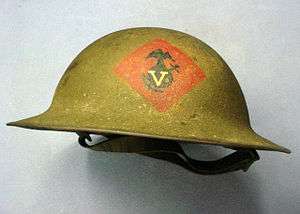 US Marine Corps M1917 (after the Brodie helmet).
US Marine Corps M1917 (after the Brodie helmet). Swiss Model 1918 helmet
Swiss Model 1918 helmet A Soviet M36 helmet
A Soviet M36 helmet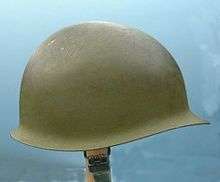 A side view of a mid 20th century M1 helmet
A side view of a mid 20th century M1 helmet The Mk III Turtle helmet used by British and Commonwealth forces from 1944
The Mk III Turtle helmet used by British and Commonwealth forces from 1944
Medieval and early Modern
- 6th century Spangenhelm.
 German great helm of the 12th or 13th century.
German great helm of the 12th or 13th century.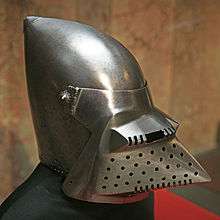 Italian bascinet from about 1400.
Italian bascinet from about 1400. English sallet of the 15th century.
English sallet of the 15th century._-_Walters_51607.jpg)
.jpg) 16th century Ottoman Zischagge.
16th century Ottoman Zischagge. French morion helmet, 17th century.
French morion helmet, 17th century. "Indian Helmet, Shield and Swords," a print by Day and Sons, London, c.1858
"Indian Helmet, Shield and Swords," a print by Day and Sons, London, c.1858 An early 19th century French officer's dragoon helmet.
An early 19th century French officer's dragoon helmet.
| Model | Origin | Users |
|---|---|---|
| Armet | 15th century | Western Europeans. |
| Barbute | 15th century | Italian states. |
| Bascinet | c. 1300 | Europeans during the Hundred Years' War(1337 to 1453) amid the kingdoms of |
| Burgonet[37] | c. 1600 | Europeans, especially by militias of |
| Capeline | late 16th century | Europeans during the 17th century, including the English Civil War in |
| Cervelliere | late 13th century | Christian Europeans in Crusades during the 14th century |
| Close helmet | late 15th century | Western Europeans. |
| Dragoon helmet | late 18th century | |
| Enclosed helmet | late 12th century | Western Europeans. |
| Frog-mouth helm | c. 1600 | Western Europeans. |
| Great helm[38] | 1189 | Christian Europeans in Third Crusade; other Europeans until 1540 |
| Hounskull | 14th century | Western Europeans. |
| Kabuto | c. 1600 | Samurai especially during the 17th century of the Edo Period Tokugawa shogunate in Medieval |
| Kettle hat | 12th century | Common all over medieval Europe. |
| Morion | 16th and early 17th centuries | Europeans (esp. associated with Spanish Conquistadores) |
| Nasal helmet | Early Middle Ages | Byzantine Empire, later common all over Europe. |
| Pickelhaube[7][8][9] | 1842 | especially by |
| Raupenhelm | c. 1800-1870 | High crested leather helmet used primarily by |
| Sallet | c. 1450 | used in Northern Europe & |
| Secrete | 17th century | Western Europeans |
| Spangenhelm[39] | 5th century | Central Asia, Near East & Europe; espec. by Scythians, Sarmatians, Persians, & Germans until 1000 |
| Tarleton | c. 1770-1800 | Crested, peaked leather helmet used by cavalry and light infantry by |
| Qing parade helmet | after 1655 till 1911 | China |
| Zischagge | c. 1600-1780 | Originated in Ottoman Empire, used by the most of the Europe. |
See also headgear listing within Components of medieval armour.
Ancient militaries
 Mycenaean Greek boar tusk helmet, Mycenae, 14th century BCE
Mycenaean Greek boar tusk helmet, Mycenae, 14th century BCE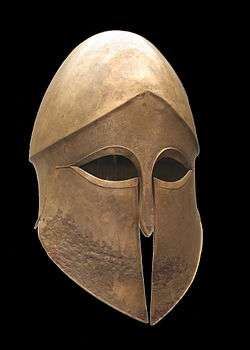
 Persian helmet (Sassanid army)
Persian helmet (Sassanid army) Roman legionary helmet or galea
Roman legionary helmet or galea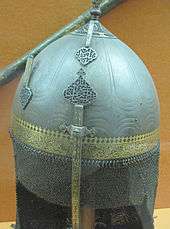 17th century Safavid helmet (Safavid army)
17th century Safavid helmet (Safavid army)
| Model | Origin | Users |
|---|---|---|
| Attic helmet | ancient Greeks | |
| Boar's tusk helmet | 17th century BCE | Mycenaean Greeks until 10th century BCE |
| Boeotian helmet | ancient Greek cavalry | |
| Chalcidian helmet | ancient Greeks | |
| Corinthian helmet[40] | ancient Greeks | |
| Disc and stud helmet | c. 400 BCE | ancient Illyrians & Adriatic Veneti until 167 BCE |
| Galea (helmet) | ancient Romans | |
| Horned helmet | c. 1000 BCE | Celtic Europeans until 700 CE |
| Illyrian type helmet | ancient Greeks | |
| Kegelhelm | ancient Greeks | |
| Negau helmet | ancient Etruscans in Negau, Slovenia | |
| Montefortino helmet | ancient Romans | |
| Pilos | ancient Greeks | |
| Pot helmet | ancient Illyrians | |
| Phrygian/Thracian helmet | 5th century BCE | ancient Greeks in Thrace, Dacia, Italia & Hellenistic Europe until c. 200 CE |
Padding
Cushioning is used to negate concussive injuries. Researchers at the Lawrence Livermore National Laboratory published a study in 2011 that concluded that the addition of an eighth of an inch of cushion decreased the impact force to the skull by 24%.[41]
References
- ↑ Shaft Graves, Mycenae
- ↑ Nobuo Komita, The Grave Circles at Mycenae and the Early Indo-Europeans
- 1 2 http://www.nps.gov/archive/colo/Jthanout/HisArmur.html
- 1 2 Heaumes Page Archived 30 November 2006 at the Wayback Machine.
- ↑ Military Trader
- ↑ Military headgears Archived 14 July 2011 at the Wayback Machine.
- 1 2 3 German-Helmets.com
- 1 2 3 Axis History Factbook: A brief history of the German Stahlhelm
- 1 2 3 German Pickelhaube Spiked Helmet Evolution Guide
- ↑ Kevlar Pasgt Helmet
- ↑ http://www.operation-helmet.org
- ↑ http://spearpoint-shop.myshopify.com/products/ops-core-fast-ballistic-high-cut-helmet
- ↑ MSA: Casques Militaires
- ↑ Advanced Combat Helmet ( ACH )
- ↑ ACH
- ↑ US Military Taking Delivery of Advanced Combat Helmets
- ↑ The Warrior
- ↑ PLCE and Body Armour Archived 12 October 2007 at the Wayback Machine.
- ↑ Šestan - Busch d.o.o. (Ltd)
- ↑ http://www.grupoinbra.com.br/inbraland.php
- ↑ http://www.rabintex.com/ProductView.asp?ID=8
- ↑ Canadian Military Police Virtual Museum
- ↑ Canada
- ↑ http://www.nahelmets.com.ar/
- ↑ http://www.operation-helmet.org/usaf.html
- ↑ Department Of The Air Force
- ↑ http://www.gostak.co.uk/composites/new%20zealand/
- ↑ Sistema Compositi SEPT-2 PLUS helmet
- ↑ Sistema Compositi SUPERUBOTT helmet
- ↑ Tecnoplast TD-71 riot control helmet
- ↑ pl:Hełm wz. 2005
- ↑ Mile Dragić Production M-97S/P
- ↑ Mile Dragić Production M-05S/P
- ↑ Index CEF Helmets
- ↑ Българските Военни Каски Archived 11 October 2007 at the Wayback Machine.
- ↑ Home of the M-1 Helmet
- ↑ myArmoury.com: The Burgonet
- ↑ 75years - Great Helms
- ↑ Simon Coupland, "Carolingian Arms and Armor in the Ninth Century", (accessed 10 March 2006).
- ↑ lookup=Hdt.+4.180.1 Herodotus, The Histories (ed. A. D. Godley)
- ↑ regg Zoroya (17 April 2911). "Larger helmet could guard against brain injury to troops". USA TODAY. Retrieved 17 April 2011. Check date values in:
|date=(help)
External links
| Wikimedia Commons has media related to Military helmets. |


